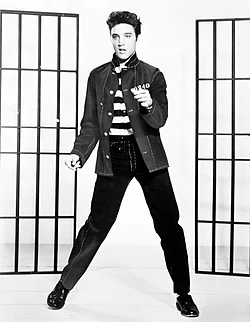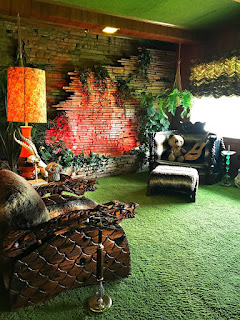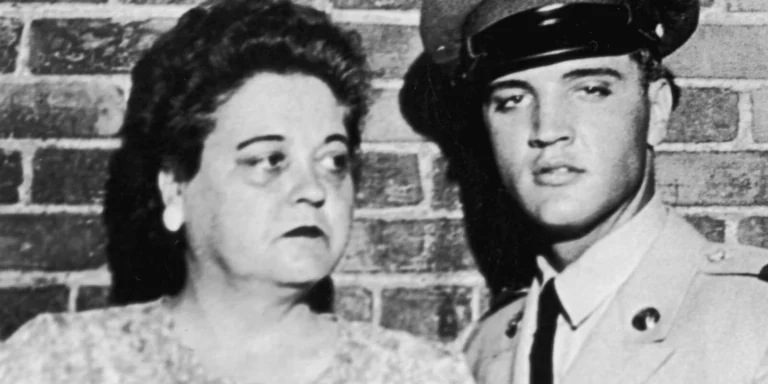ELVIS, THE LAST REFUGE IN THE JUNGLE
By Mahnuel Muñoz
On October 29 and 30, 1976, Elvis Presley’s last recording sessions took place in the famous Jungle Room at Graceland, the same room where a few months before the songs for the album “From Elvis Presley Boulevard Memphis, Tennessee” were recorded. , a room that, in the words of my dear Amalia Perales, contains a strong emotional impregnation capable of stealing tears.
The expectations of success were good, working in his home environment and with a band made up of regular faces (James Burton, John Wilkinson, Chip Young and Charlie Hodge on guitars, Jerry Scheff on bass, Ronnie Tutt on drums, Tony Brown and David Briggs on acoustic and electric pianos respectively and the choirs of JD Sumner & The Stamps, Kathy Westmoreland, Myrna Smith and Sherrill Nielsen), but the truth is that they were two unproductive days, which the King faced without interest; He would leave the studio between songs to seclude himself in his room and allow himself to be distracted by any trifle. He was worried about the upcoming release of the book in which Red West, Sonny West and Dave Hebler, recently dismissed from the singer’s entourage, were going to expand on his most intimate aspects. Unable to calculate the extent of the book’s revelations, Elvis put himself in the worst scenario and his world, already cracked, completely collapsed. But just as the ruins of a palace cannot hide past greatness, the King was able to display his in such difficult circumstances and roar for the last time with the authority of always.
(NOTE: Later arrangements with new vocal and instrumental tracks were added to all four songs between January and April 1977.)
REPERTOIRE OF SONGS
“IT’S EASY FOR YOU”
Probably the only composition that Tim Rice and Andrew Lloyd Webber signed outside the field of musical theater, in which they achieved universality with titles such as “Jesus Christ Superstar” (1971) or “Evita” (1978)
It is the heartbreaking story of a man who has lost his family to a lover who also abandons him. Elvis’s closeness to reality is almost unbearable; Linda Thompson, Elvis’ partner in recent years, had decided to leave after not being able to assume the responsibility of her relationship with him any longer.
The artist plunges his hands into the pool of anguish of his soul to model a bloody and precise interpretation that deserves to be ranked among the most inspired of his late production. It is also a promising sample of the solvency that Elvis would have shown in the new pop of the late 70s and early 80s. The song serves to close the album “Moody Blue“, and the verses “If you get tired of the good life , call me in a year or two” are particularly heartbreaking knowing that when the album went on sale, Elvis had barely two months to live.
“WAY DOWN”
A futuristic and supercharged rock and roll, groundbreaking at a time when punk made us look back to basics. With traces of blues and gospel, Layng Martine Junior‘s composition triumphs where “Burning Love” could not, showing an energetic, evocative and even threatening Elvis, at the height of the early 70s. The voice sounds firm and tempered, the The rhythm section is a precise and forceful machine and the choirs bring a lively color to the mix, excellently produced. I have no doubt that it would have been a high point in their live shows.
The instrumentation of a song titled “There’s A Fire Down Below“, composed by Jerry Scheff, was recorded in the same stylistic line as “Way Down“. Although Elvis seemed to like the song, his intentions to record it soon fizzled out amid a string of bad jokes and swear words.
“PLEDGING MY LOVE”
This Ferdinand Washington and Don Robey theme was proposed by Chip Young during the sessions. It had been a posthumous success for singer Johnny Ace, who died on Christmas 1954 at age 25 after accidentally shooting himself with a gun.
Based on the version that singer Delbert McClinton had recently published – but, of course, improving it in every aspect – Elvis returns to the year of his artistic flowering, and the memory of his first experiences and emotions seems to fuel the fire in his heart and his throat, which he puts at the service of a masterful reading of the theme, bringing together the musicians at his level, who seem to enjoy the trip, in a kind of jam session in which the compass is the pure and simple joy of music , in the vein of “Merry Christmas Baby” (1971) or “Tiger Man” (1975). This song and “Way Down” were released as a single that reached number 18 on the US charts and topped the UK charts.
“HE’LL HAVE TO GO”
Elvis puts an end to his work in the studio with country, just as he began in 1954 with “I Love You Because.” In this case he reviews a hit by Jim Reeves from 1960, the same year that the King returned from military service to begin a new stage as an artist for all audiences and a blockbuster actor. Elvis apparently recorded his vocals on October 31, 1976 over instrumentation recorded the day before, during one of the singer’s frequent “escapes.” Despite this, Elvis’ performance is solid and captivating. He is immersed in the story, which is revealed to be a bitter sequel to “Are You Lonesome Tonight?” His deep voice and heavy instrumentation make me see him clutching the phone, in a shady corner of Graceland, with Priscilla on the other side. The artist creates an atmosphere of farewell, dense and twilight, heartbreakingly faithful to the decline of man. The King, like an alchemist, in his last gestures, continues to extract gold from the ashes.
In just four songs, Elvis Presley closes the circle of his career, with a look at the present of his music – and a future that never came – as well as a toast to a glorious past that, inexplicably, he always seemed to try to forget.
The material was included on the album “Moody Blue” (1977), making it a more significant musical testament than it may seem if listened to without due attention.
Information provided by Mahnuel Muñoz
If you want to visit more articles about the life of Elvis Presley, enter the following Elvis Radio 24h link: https://elvisradio24h.com/tag/articles Thanks TCB ?
We remind you that you can also listen to Elvis Radio 24 hours on your mobile phone by downloading our free applications for Android in the Play Store ? https://play.google.com/store/apps/details?id=com.icreo.elvisradio24h1, and for iPhone in your Apple Store ? https://apps.apple.com/app/elvis-radio-24h/id6444257119. Thank you very much!!…










